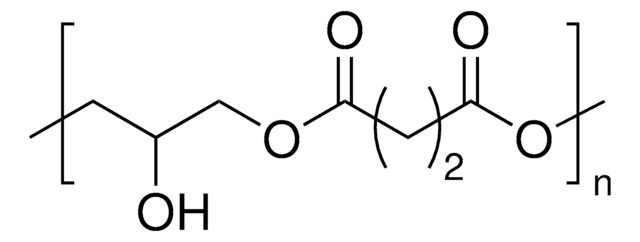939625
Ethyl ethylene phospholane monomer

Synonyme(s) :
2-Ethoxy-1,3,2-dioxaphospholane 2-oxide, Ethyl ethylene phophate
Se connecterpour consulter vos tarifs contractuels et ceux de votre entreprise/organisme
About This Item
Formule empirique (notation de Hill):
C4H9O4P
Numéro CAS:
Poids moléculaire :
152.09
Numéro MDL:
Code UNSPSC :
12162002
Produits recommandés
Forme
liquid
Niveau de qualité
Couleur
colorless
Température de stockage
−20°C
Chaîne SMILES
O=P1(OCCO1)OCC
InChI
1S/C4H9O4P/c1-2-6-9(5)7-3-4-8-9/h2-4H2,1H3
Description générale
Ethyl ethylene phospholane is a versatile monomer building block for the synthesis of biocompatible and biodegradable polymers. Ring opening polymerization (ROP) of this phospholane monomer in the presence of metal/organocatalysts yields poly(phosphoester)s (PPE) that are commonly used in biomedical research applications.
Application
Ethyl ethylene phospholane, also known as ethyl ethylene phophate or 2-ethoxy-1,3,2-dioxaphospholane 2-oxide, is used in many polymerization applications including:
- Polymer synthesis: This monomer is used as a building block to synthesize biodegradable and biocompatible polyphosphoesters
- Nanocarrier development: Polymers synthesized from the ehtyl ethylene phospholane monomer create efficient nanocarriers for drug delivery and gene therapy, including for use in targeted and controlled release of therapeutics
- Hydrogel fabrication: This monomer can be used to develop polymers for tissue engineering applications, offering scaffods with excellent biocompatibility and potential for cell growth and regeneration
Caractéristiques et avantages
Features and benefits of the ethyl ethylene phospholane include:
- Biocompatible and biodegradable: Through ring opening polymerization (ROP) of ethyl ethylene phospholane monomer, it is possible to synthesize polymers used in biomedical applications that are cell compatible and degrade over time
- Thermoresponsive behavior: In aqueous solutions, this monomer exhibits a lower critical solution temperature (LCST), making it responsive to changes in temperature, expanding its potential in controlled release system
- pH-responsive degradation: The resulting polymers can be designed to degrade at specific pH levels, allowing for targeted release of encapsulated substances
- Water soluble: This monomer enables the synthesis of water-soluble polymers, facilitating their incorporation into various aqueous formulations The biomedical research grade ethyl ethylene phospholane monomer opens the door to advanced biomaterials and provides researchers and developers with a powerful tool to create biocompatible and customizable polymers for a range of applications in biomedical research.
Produit(s) apparenté(s)
Réf. du produit
Description
Tarif
Code de la classe de stockage
10 - Combustible liquids
Classe de danger pour l'eau (WGK)
WGK 3
Point d'éclair (°F)
Not applicable
Point d'éclair (°C)
Not applicable
Certificats d'analyse (COA)
Recherchez un Certificats d'analyse (COA) en saisissant le numéro de lot du produit. Les numéros de lot figurent sur l'étiquette du produit après les mots "Lot" ou "Batch".
Déjà en possession de ce produit ?
Retrouvez la documentation relative aux produits que vous avez récemment achetés dans la Bibliothèque de documents.
Shiyi Zhang et al.
ACS macro letters, 1(2), 328-333 (2012-08-07)
"Click" chemistry is a library of efficient and reliable reactions, which have been used to functionalize various classes of bio- and synthetic macromolecular systems for the incorporation of designed properties and functions. In this report, azide-alkyne Huisgen cycloaddition and thiol-yne
Tobias Steinbach et al.
Angewandte Chemie (International ed. in English), 54(21), 6098-6108 (2015-05-08)
Poly(phosphoester)s (PPEs) play an important role in nature. They structure and determine life in the form of deoxy- and ribonucleic acid (DNA and RNA), and, as pyrophosphates, they store up chemical energy in organisms. Polymer chemistry, however, is dominated by
Notre équipe de scientifiques dispose d'une expérience dans tous les secteurs de la recherche, notamment en sciences de la vie, science des matériaux, synthèse chimique, chromatographie, analyse et dans de nombreux autres domaines..
Contacter notre Service technique
![N-[2-(2-Hydroxyethoxy)ethyl]methacrylamide contains MEHQ as inhibitor](/deepweb/assets/sigmaaldrich/product/structures/303/296/5f2feb4f-b8ea-4219-b495-50d1f731c523/640/5f2feb4f-b8ea-4219-b495-50d1f731c523.png)







